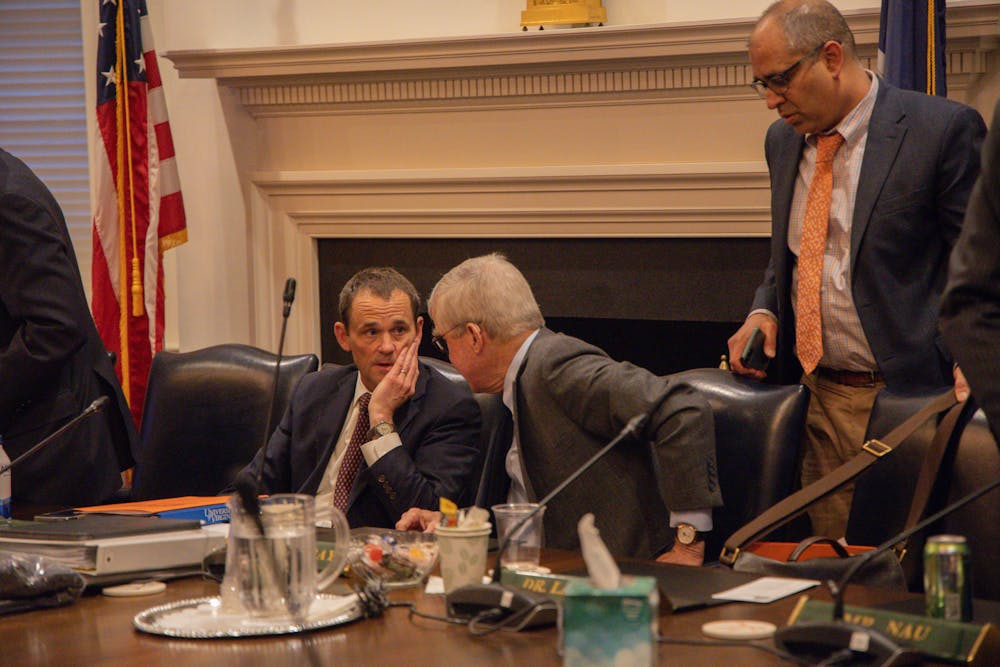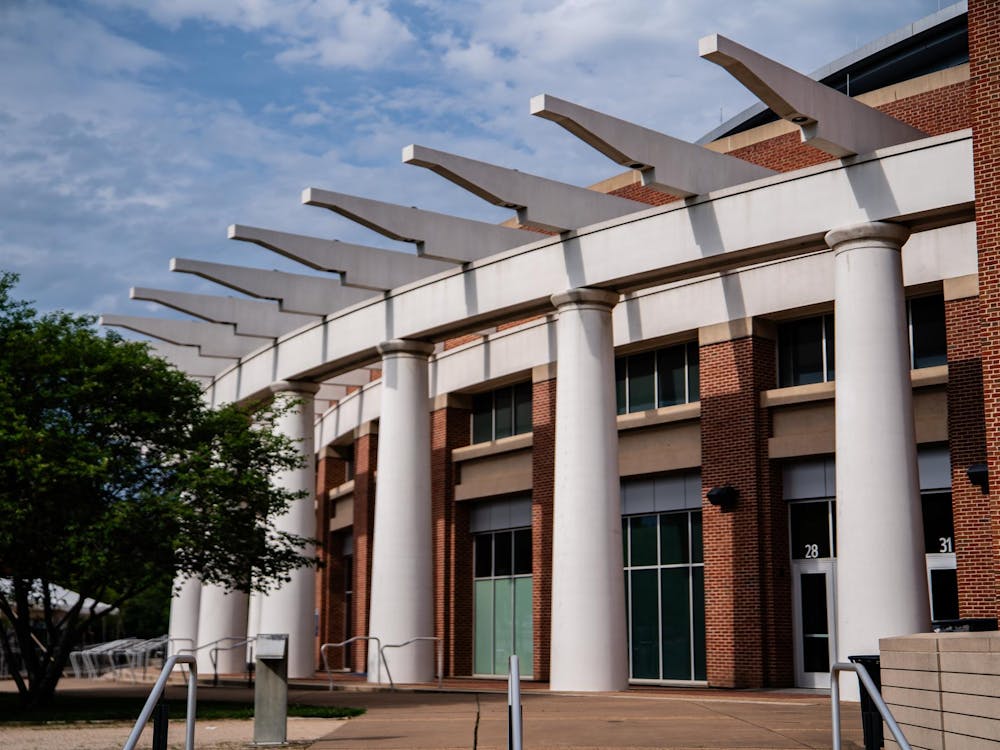University President Jim Ryan said the University needs a uniform set of principles outlining when it will officially respond to social and political issues happening around the world during the full meeting of the Board of Visitors Friday. Ryan said this need has become more evident following the statement he put out on behalf of the University condemning the actions of Hamas, which sparked complaints from certain students on Grounds.
Ryan presented the idea to create a group which would design principles to guide the University on when it will proceed with commenting on political and social events in the future. The committee would consist of University faculty, students, Board members and alumni.
Ryan said the group could function similarly to the committee he appointed with Liz Magill, University of Pennsylvania president and former University executive vice president and provost, that drafted the principles of free speech and free expression. That group’s statement, formally adopted by the Board in 2021, outlines the University’s commitment to a diversity of perspectives and first amendment rights.
While Ryan said he has benefitted from the clarified free speech policy, he acknowledged that creating a set of guiding principles outlining the University’s responsibility to comment on public events will likely prove more challenging.
“I'm not sure it's going to be as easy to come up with principles in this context,” Ryan said. “But I personally would feel better if we at least try and if we had something to point to when the question comes up.”
Ryan sent an email to the University community following the Oct. 7 attacks by Hamas on Israel and followed that statement in early November by offering mental health resources for students, reaffirming University policy against antisemitism and Islamophobia and announcing a new initiative to improve experiences for affected community members.
Student groups responded to the conflict in the Middle East with widespread activism across Grounds, and some condemned Ryan for his email, calling it “biased against Muslim and Palestinian students.” Ryan said this controversy has prompted him to consider how the University should respond to all social and political issues.
Other university presidents are facing similar scrutiny over the balance between protecting freedom of speech and condoning threatening behavior. Magill resigned from her position Saturday following widespread criticism for her refusal to affirm that calling for the genocide of Jews would violate the Univeristy of Pennsylvania’s code of conduct during a House committee hearing on antisemitism at college campuses.
Ryan said many universities still look to a principle from the University of Chicago’s Kalven Report from 1967, which recommends that universities never comment on social or political events unless they interfere with the operations of that university or violate the values of that university. Ryan said that the second exception is “capacious.”
“The basic idea, which I find really attractive, honestly, is that universities should be home to the critics but not be the critic itself,” Ryan said. “It’s connected to the idea of free speech … one way to ensure that there's a robust exploration of ideas is for universities not to take positions on them — instead, that should be left to faculty and students to have full blown debates.”
However, Ryan said that while the idea sounds simple in theory, it is hard to implement in practice due to different trends in communication between 1967 and today. He said that today’s university presidents communicate regularly through social media, as opposed to university presidents in the past who had to go out of their way to make a comment.
This trend in constant communication makes it challenging for presidents to remain silent in the face of tragic events, according to Ryan.
“If one day you're posting about your dogs, the next day you're posting about the basketball team, and something cataclysmic happens in the world, and you say ‘I can't say anything about that,’” Ryan said.
Ryan said that he has tried to only comment on events that are “truly shocking and clearly felt by members of our community,” but this set of guidelines doesn’t feel adequate to him.
“You obviously can't comment on every single thing that happened,” Ryan said. “And what happens is once you start commenting, if you don't comment on something, it's seen as a choice.”
Several Board members were supportive of the idea of creating a group to draft guiding principles to the University. Board members Doug Wetmore and Rachel Sheridan both said that they were very supportive of the idea of creating a group to draft guiding principles, saying that a formal policy would aid Ryan in making decisions.
“I'm very supportive of pursuing and exploring coming up with a policy that would, I think, take some pressure off of you [being] in constant need to reply, still allow you for avenues to have your expression and your relationship with the community, but at the same time, preserve commentary … because not everyone cares what we think about every topic,” Sheridan said.
While other Board members voiced their own opinions for what those principles may look like, ranging from complete neutrality to a mandatory 3-day waiting period between events and issuing statements, no member said that they would be opposed to the creation of this group.
Ryan also presented a list of his priorities as University President for the 2023-24 year, which includes 11 initiatives. They include promoting health and safety in the community, continuing to respond to the Nov. 13 shooting, the Emmet-Ivy development and engaging with the University by continuing to open Carr’s Hill to students.
Ryan said that a twelfth he will be adding to the list is the future of college athletics. The full list of priorities can be found here.
Board member James B. Murray Jr. said that he thinks prioritizing student health and well-being, particularly in regards to student mental health, is important.
“I think [mental health] deserves a greater look by the Board, with help from the administration, [to] understand — what is the problem here at U.Va.? And are we in worse shape or better shape than other institutions?” Murray said.
The full Board voted in the final open session meeting Friday to confirm all resolutions approved or tabled by the separate committees. Both items on the consent agenda passed and seven of the eight action items passed. The consideration of a name change to Alderman Library, which will open to students in January, was tabled by Buildings and Grounds Committee Chair John L. Nau III.
After the resolutions were approved, Board member Bert Ellis stated his concern regarding the University Guide Service, saying the student-led tour group drives away young people from attending the University.
“The guided tours at this University are still anti-University in a significant number of the tours,” Ellis said. “And it’s got to be fixed.”
Two other members of the board, John Nau III and Paul Harris, said they agreed with Ellis.
While the Office of Undergraduate Admissions offers tours through paid student interns, the student-run University Guide Service has led about half of undergraduate admissions tours on Grounds this fall.
University Rector Robert Hardie said Vice Provost for Enrollment Stephen Farmer is looking into the Guide Service this semester and will make a recommendation to University President Jim Ryan and the Board.
Board member Elizabeth Cranwell said that Farmer is to deliver his recommendations Dec. 13. Hardie said more discussion surrounding the Guide Service will be on the Board’s agenda for its next meeting.
The Board heard several other informational presentations during the full board meeting. Larry Roberts, director of the Sorensen Institute, and Charles Hartgrove, managing director of the Virginia Institute of Government, shared their organizations’ goals and impacts across Virginia. The Sorensen Institute for Political Leadership provides programs to bring together bipartisan groups in Virginia and foster political discussion, while the Virginia Institute of Government works to develop leadership in Virginia’s local governments.
Michael Kennedy, chair of the Faculty Senate and Education school professor, also gave a presentation to the Board about the different ways that faculty members work on Grounds, with varying degrees of course teaching, research and other scholarly engagements.
The Board will meet again from Feb. 29 to March 1, 2024.







